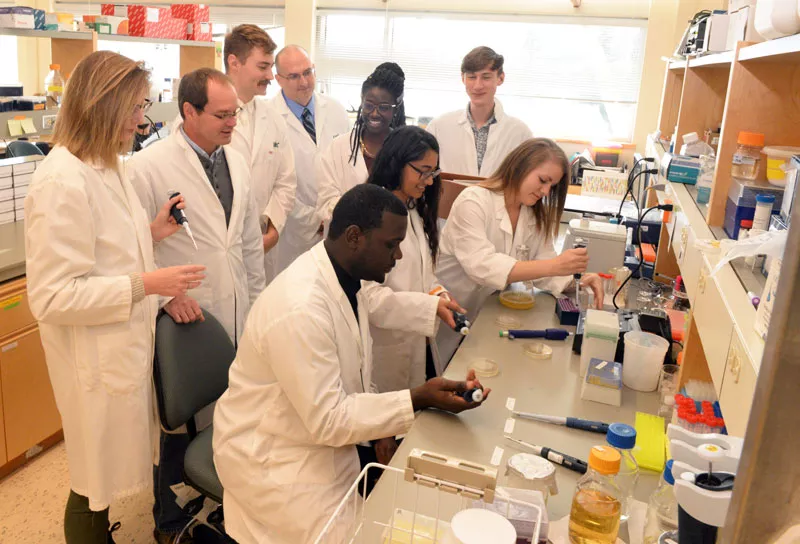Finding Solutions on How to Treat A Superbug
Since January, student researchers in UNBC's Synthetic Biology Club have been focused on finding solutions on how to treat the MRSA bacteria strain. The strain is known to health professionals as a superbug. It’s a big problem in hospitals worldwide and is resistant to even the strongest antibiotics. The team is comprised of eight biochemistry and two biomedical students, along with faculty supervisor Dr. Brent Murray. Five of those members are en route to Boston today to present their results and findings at the 2017 iGEM (International Genetically Engineered Machine) competition.

Since January, a team of student super sleuths from the University of Northern British Columbia have spent hundreds of hours in the lab attempting to find solutions to combat the MRSA bacteria strain.
The strain is known to health professionals as a superbug. It’s a big problem in hospitals worldwide and is resistant to even the strongest antibiotics.
Student researchers in UNBC’s Synthetic Biology Club have been focused on finding solutions on how to treat it.
Their research and development has included stopping production of toxins or resistant proteins in the superbug that resist antibiotics without modifying the MRSA bacteria strain using a technique called “gene silencing.”
It’s their way of finding a local solution to a global problem.
The team is comprised of eight biochemistry and two biomedical students, along with faculty supervisor Dr. Brent Murray. Five of those members are en route to Boston today to present their results and findings at the 2017 iGEM (International Genetically Engineered Machine) competition.
The iGEM competition is the largest synthetic biology competition and conference worldwide. UNBC is among 13 teams from Canadian universities and high schools participating in the event that features more than 300 teams from around the world, including Harvard, Massachusetts Institute of Technology, and Oxford.
It’s the second-straight year UNBC’s Synthetic Biology Club has competed at iGEM and students are confident going into this year’s competition.
“We have had some results that add to the conversation surrounding gene silencing in MRSA,” said Club co-president Keanna Woidak. “We can contribute to the ongoing conversation on how to treat MRSA.”
Without the support of various donors the team wouldn’t even be competing in Boston.
STEMCELL Technologies based in Vancouver, helped the club with a Gold-level sponsorship. Dr. David Llewellyn, a UNBC alumnus (BSc Chemistry, 1997) is the Vice President for Business Operations.
“STEMCELL’s mission is to advance scientific research and knowledge,” said Llewellyn. “A key component of that is enabling students to get the opportunities they need to develop and grow.
“STEMCELL wanted to support this event because it is a great learning opportunity for the students. We hope that by being part of the competition, we will foster the students’ love for science.”
Llewellyn credits his time at UNBC as an undergraduate student for providing him with coaching, mentorship and describes the experience gained working in the lab as a game-changer. The rich learning experience prepared him for graduate school.
In his role at STEMCELL, he is responsible for marketing products that support the life sciences research industry internationally.
Llewellyn, who regularly visits the University to meet with students and even hires UNBC graduates, had an opportunity to meet with the Synthetic Biology Club students in October and talk to them about their project.
“MRSA infections are a very serious problem,” he said. “The club’s MRSA project is a creative approach to addressing the issue and has a lot of potential.”
“He is really excited about the work being done at UNBC,” added Woidak. “Donors make this experience possible.”
Other sponsors include Spirit of the North Healthcare Foundation, NewGold, Genome BC, and UNBC’s Information Technology Systems.
“Donors mean everything to us, we wouldn’t be able to have this project without donors,” added club co-president Brendan Reiter.
Besides working as super sleuths in the lab prior to their departure, students also did community outreach, known as human practice, which comprises 50 per cent of their overall project.
They created an activity book for elementary students and lesson plans for high school teachers in schools around Northern B.C, as well as presented the principles of synthetic biology at local high schools.
They also conducted two workshops at Exploration Place for inquisitive minds.
“It was an opportunity for us to introduce students to biotechnology, which is where the future of science is moving towards,” said Reiter. “There was a lot of enthusiasm shown by everyone and we received some fantastic comments.”
They also worked with the Public Health Unit at Northern Health.
All of their project and human practices work is described and documented on their website, http://2017.igem.org/Team:UNBC-Canada, and are judged on a combination of lab work and human practices.
The iGEM competition begins on Thursday and wraps up on Monday. The UNBC team will be presenting on Sunday.